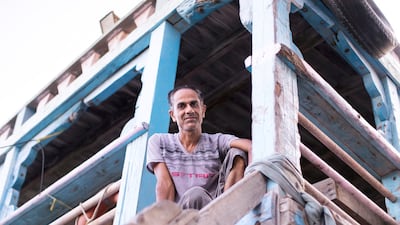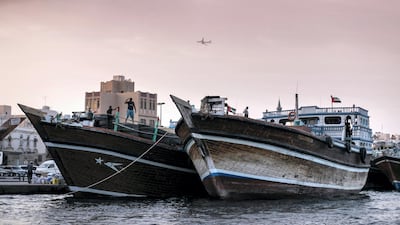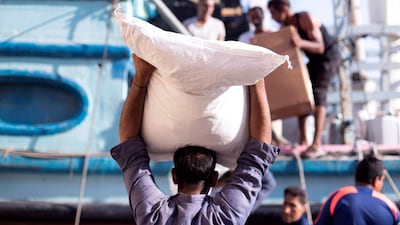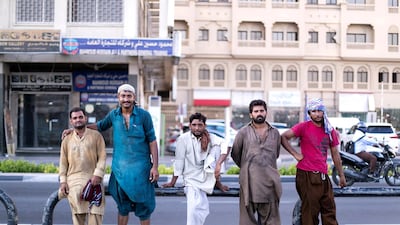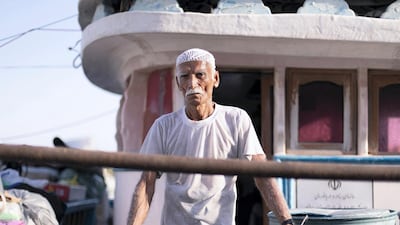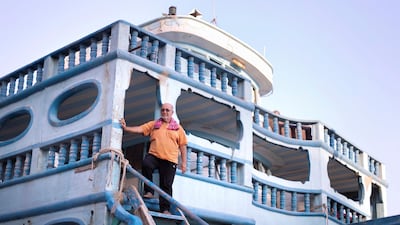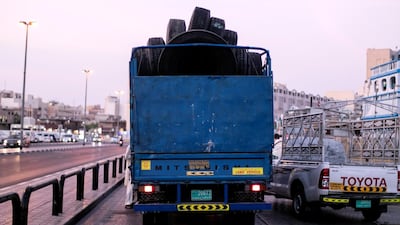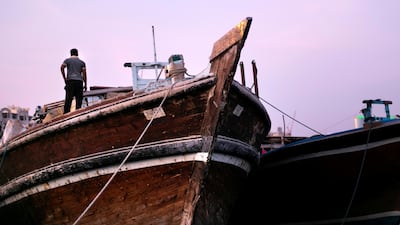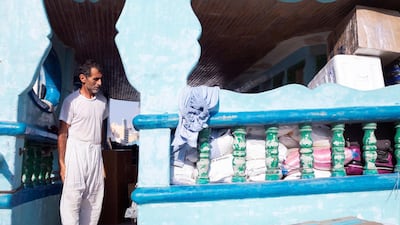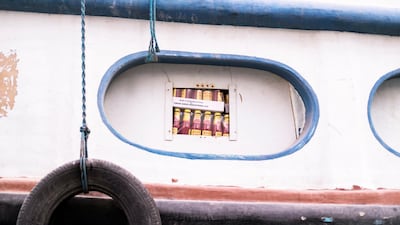Dozens of blue wooden dhows on Dubai Creek were loading up for another journey. Teams of workers shrugged off the searing July heat and hauled refrigerators, air conditioners, tyres, bags of rice and fishing nets onboard. Crates of bottled ketchup peered out from the portholes.
The Creek has been at the heart of trade routes between Iran and the UAE for centuries. Traditional dhows, now powered by diesel engines, ply the route between Deira and southern Iranian ports such as Kish Island, Bandar Abbas and Bushehr braving rough seas, oil tankers and naval patrols on 13 to 14-hour journeys. But fresh tensions between Iran and the United States are heaping pressure on them.
"It is different from what it was a few years ago," said Yaqoub Yousef, 40, a dhow captain from Kish Island. Mr Yousef makes the journey about six to seven times a year – down from as many as 14 a few years ago. "Work is a lot slower."
Dubai Creek is the historic heart of the emirate. It was there where the great pearling fleets returned from the summer diving seasons and then where modern hotels and skyscrapers emerged. Now abras scuttle back and forth with tourists, while new developments are changing the face of old Dubai.
But the dhow trade lingers on. Huge 300 tonne hulking ships are moored all the way down the Deira side, redolent of the old sailing dhows that travelled the trade routes between Dubai, India and East Africa hundreds of years ago. They chug across the Gulf laden with cans of tomato juice, flat-screen TVs, water dispensers, electric fans and cookers. Much of the trade is lucrative re-export whereby goods are imported from China and elsewhere and then sent across to Iran.
Many of the Iranian sailors have worked decades plying these routes, know no other life and feel at home on their dhows in Dubai. Many did not wish to give their names or speak to the media but said last month's tanker attacks in the Gulf of Oman and renewed tensions in the Arabian Gulf had made no difference to their work.
Relations between Iran and the West have worsened following a US decision last year to withdraw from a nuclear deal with Iran and Europe. Since then, Tehran has reduced its commitments to the agreement, increasing its enrichment of uranium over permitted limits. The country also continues to cause tensions in the region over its backing of Houthi rebels fighting in Yemen and Hezbollah in Lebanon and Syria.
"For now, no-one is stopping us on the sea," said Murad Rashid, 70, a dhow engineer who will make a 17-hour journey to Bandar Abbas on Friday. "I will keep going."
But the impact of sanctions imposed last year targeting Iran's oil and banking sector has hurt them in the pocket. The weakness of the Iranian rial means imports are more expensive and people cannot afford them. Banks in the UAE are also reluctant to deal with Iranian orders.
Monthly trade between Iran and the UAE, too, has been reducing, down from $2.49 billion (Dh8.8bn) in December, 2017 to about $1.5bn (Dh5.5bn) at the start of this year.
"Now it is difficult with the situation in Iran," Capt AbdulRedha Mohammed, 43, shouts down from the bridge of one dhow. "The currency is low - this is a problem as things are more expensive there."
His boat brings watermelons, cabbages and tomatoes from Kish to Dubai and they return when the boat fills up with orders. Life on the quayside is tough, there are no toilets, and he walks in the spice souq to pass time. Despite his young age, Mr Mohammed said he is an old man now. "I've aged because of this work. What else would I do? Who will take me?"
The impact of sanctions is clear to see in Deira. There are about 400,000 Iranians in the UAE but this is believed to be declining. Many small Iranian shops that sold clothes and spices are shut and a closed and forlorn Iranian Aseman Airlines outlet on the Creek points to a more optimistic past.
Even in Iran, officials say the dhow business is suffering. According to Iran’s labour news agency, the head of dhow owners co-operative said the trade is experiencing “a gradual death”. Iranian officials have also said the trade has shrunk 13 per cent from March to June compared with the same period last year.
But the sailors moored at the Creek are not giving up. Most spoke with a steely resolve to beat on against the current.
"I do not think business will go down much less," said Mr Yousef. "There are no security issues. I will stay here for years to come," he said.
"I'm optimistic," agreed Mr Mohammed. "There is a God."
